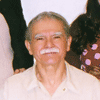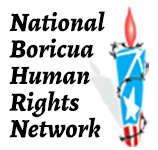Please view the video, Dissent is Not a Crime, for more background on Carlos Alberto Torres and Oscar López Rivera.
Also see, Jan Susler’s article, More than 25 years: Puerto Rican Political Prisoners.
Puerto Rican Political Prisoners:
- Oscar López Rivera
- Avelino González Claudio
- Noberto González Claudio
 Born on January 6, 1943
Born on January 6, 1943
Postal mailing address:
Oscar Lopez Rivera
87651-024
FCI Terre Haute
P.O. Box 33
Terre Haute, IN 47808
Oscar was born in San Sebastián, Puerto Rico in 1943. His family moved to the U.S. when he was an adolescent. Adapting to his new home, he managed English well enough to help the Spanish speaking adults in the neighborhood make their way through the maze of public and private services. Like many young Latino and African American men, he was drafted into the U.S. army. It was in Viet Nam that Oscar began to understand what it meant to be Puerto Rican in the United States, and the need for a people to control its own destiny. His service in Viet Nam earned him the Bronze Star. When he returned from the war in 1967, he found that drugs, unemployment, housing, health care and education in the Puerto Rican community had reached dire levels and immediately set to work organizing to improve the quality of life for his people. Oscar worked in the creation of both the Puerto Rican High School and the Puerto Rican Cultural Center, and participated in the development of the Committee to Free the Five Puerto Rican Nationalist Prisoners. He was involved in the struggle for bilingual education in public schools and to force universities to actively recruit Latino students, staff and faculty. He helped to found educational programs at the maximum security prison for men at Stateville, IL. He worked in the community against drugs and police brutality. He also worked on ending discrimination in public utilities like Illinois Bell, People’s Gas and Commonwealth Edison. While those in the community respected his tireless work, the establishment took action to stop him in his tracks. He and other young Puerto Ricans, inspired by heroic guerilla movements throughout the world, decided their work for the independence of Puerto Rico could best be conducted in clandestine fashion.
He was arrested in 1981, accused of being a member of a clandestine force seeking independence for Puerto Rico, and sentenced to 55 years for seditious conspiracy. In 1988, as the result of a government-made conspiracy to escape, he was given an additional 15 years, a sentence which will begin only after he has finished serving the 55 year sentence. His release date is 2027, when he will be 84 years old.
From 1986 to 1998, he was held in the most super maximum security prisons in the federal prison system, in conditions not unlike those at Guantanamo under which “enemy combatants,” are held, conditions which the International Red Cross, among other human rights organizations, have called tantamount to torture. Then, after seven years in the general population of a maximum security prison, he was transferred to a new, more harsh penitentiary which is the home of the federal death row. In 2008, for the first time since his arrest in 1981, he was placed in a medium security prison, albeit with the unique condition that he report every two hours to corrections staff.
In spite of 28 years of adversity in prison, Oscar has maintained his integrity—political, physical, emotional, intellectual. Physically fit, studious, and focused, he reads voraciously, keeps up to date with current affairs, and writes. He has also become a talented, prolific artist, whose drawings and paintings form part of an itinerant exhibit with Carlos Alberto’s ceramics, Not Enough Space. On the occasion of the 25th anniversary of his and Carlos Alberto’s imprisonment, the National Boricua Human Rights Network and the Comité Pro Derechos Humanos toured the exhibit throughout the United States, Puerto Rico, and Mexico.
Oscar’s daughter, Clarisa, lives in Puerto Rico with her daughter Karina. Because of the harsh conditions, including non-contact visits, Karina was not able to touch her grandfather until she was 9 years old. Their family visits are few and far between, because of the expense of long distance travel, and because arbitrary and punitive visiting policies serve as a disincentive.
 NCI # 357422
NCI # 357422
PO Box 665
Somers, CT 06071
Friends and Family of Avelino González Claudio
Apartado Postal #22282
San Juan. P.R.00931-2282
Avelino González Claudio. . . A Tireless Fighter
In August of 1985, Avelino González Claudio was accused of participating in the planning and authorization of an operation to secure $7,117,000 from a Wells Fargo armored truck in Hartford, Connecticut on September 12, 1983, along with other Puerto Ricans and two North Americans. The operation was carried out by a clandestine organization fighting for the independence of Puerto Rico, the PRTP-Macheteros. Avelino was not arrested at the time. However, more than 20 years later, he was arrested in Manatí, Puerto Rico, on February 7, 2008.
Avelino was born in the town of Vega Baja on October 8, 1942. As a student at the University of Puerto Rico, he became a member and then vice-president of the Pro-Independence University Federation (Federación Universitaria Pro Independencia-FUPI). In the mid-1960’s, he married and moved to New York City, earning his living on Wall Street, and working with the Puerto Rican community, joining and then leading the Vito Marcantonio Mission of the Movemiento Pro-Independencia (MPI) in New York. He and his family of four children returned to Puerto Rico, where he worked in the independence movement, including administering the political journal Pensamiento Crítico (Critical Thought).
When the arrests of 1985 took place, and Avelino was not arrested, he assumed the identity of José Ortega, and, while the FBI pursued him, he lived a quiet life, working as a computer teacher to support his family and contributing constructively to his nation, seeking to improve the services provided by the Department of Education.
The charges against those arrested in 1985 had various results: Carlos Ayes, Filiberto Ojeda, Juan Segarra, Norman Ramirez and Roberto Maldonado went to trial in 1989; Ivonne Meléndez Carrión also went to trial—some were acquitted, others convicted and sentenced to terms ranging from one year to 55 years; while Orlando González, Hilton Fernández Diamante, Jorge A. Farinacci, Isaac Camacho, Elías Castro and Angel Días Ruiz negotiated a plea agreement in 1992. They were sentenced to terms of five years in prison. Two others have never been arrested: Avelino’s brother Norberto and Victor Gerena, and are being sought by the FBI.
Avelino is currently being held in Somers, the state of Connecticut’s supermax prison, far from his family and his nation, where he is locked down 23 hours a day, with no access to family visits or phone calls, in conditions which are calculated not only to interfere with his ability to prepare a defense, but which are tantamount to torture. He is awaiting trial in federal court in Hartford.
Articles on Avelino González Claudio
Noberto González Claudio
09864-000
Wyatt Detention Facility (DWWDF)
950 High Street
Central Fall RI 02863


